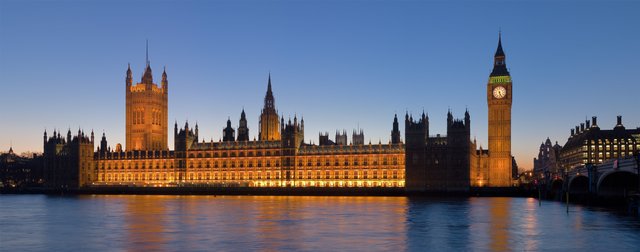Why politicians should be scared of Bitcoin - Part 1
In a 3 part series I take a look at what cryptocurrency technology can do for politics and how it could literally take over the world!
For a while now I've been dissatisfied with the political system in the UK. But I'm not alone. The recent unconvincing election results in the UK and Germany with Theresa May and Angela Merkel securing a majority through coalition (42.3% and 32.9% respectively) illustrate the divide. Not to mention the uneasy Brexit referendum result (51.89% leave) and Trump's unexpected US election win (57%).
But my concerns go deeper than who gets elected. To me elections and our system of representational *democracy is at best a multiple choice question where there is no "D. None of the above" choice. And at worst is an accepted system of corrupt, untrustworthy, irrational and unaccountable overpaid puerile *autocrats.

Palace of Westminster - UK Houses of Parliament
But democracy has got us here, it can't be that bad!
...I hear you cry, and you're right. Democracy was invented in Athens by the Greeks two and a half thousand years ago, but ironically was a direct democracy (more on that later). Since then many different regimes have come and gone all over the world. The gradual fall of the monarchy in the UK can be traced back to the Magna Carta in 1215, but democracy as we know it today arguably started as recently as 1832.
But think about it. Back then there were far fewer people, most of them were not educated, transport and hence communication was difficult and slow. Having a system of representatives for each area made a lot of sense, and to a certain extent still does. That is if those representatives could be trusted to actually represent the people's views and not get carried away with their own opinions and agendas.
One problem that I believe representation suffers from is that you are not only electing a person but also a political party. Each political party comes encumbered with a set of policies, some of which you may and may not agree with at the same time. So immediately your decision boils down to selecting the best of a bad bunch. And even if your representative and party become elected, all too often they can't be trusted to deliver on their badly researched and thought-out promises anyway.
The point is that representational democracy no longer represents you, it asks you to buy into one of its few malformed and impersonal offerings.
Okay, so what's this gotta do with Bitcoin?
Well before I get to Bitcoin, I first need to tell you a bit more about direct democracy, that I mentioned was the earliest form of democracy. More on this in Part 2!
* Democracy
Is a Greek word which comes from two words: Demos and Kratos, which roughly translate as People and Power respectively. Because of political parties, politicians tend to stand for a set of policies which they try to persuade people to support. Since these policies are normally their party's solutions to the perceived issues you could argue that representational democracy as we know it isn't a democracy at all. This is because the flow of decision, and hence power, is outward toward the people rather than inward.